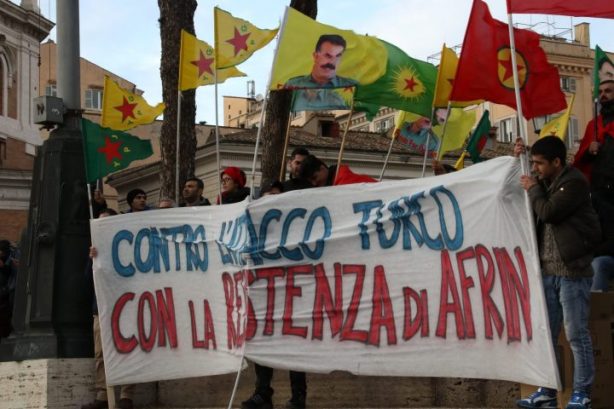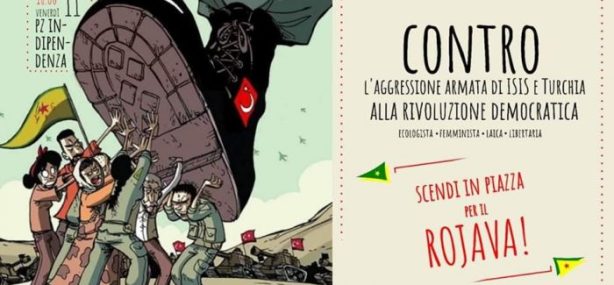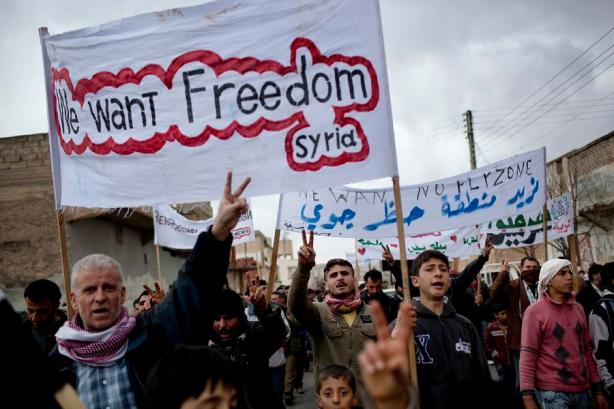
WRITTEN BY Francesco Petronella, translated by Mary Rizzo
Why is the war in Syria and its dead remembered only if Trump and Erdogan intervene, badly? Or when something touches Rojava?
Operation “Spring of Peace”, conducted on Syrian territory by the Turkish army against the Kurdish YPG militias (part of the security forces of the NES, commonly known as Rojava), comes as a thunderstorm that wipes out the fog of hypocrisy. It clearly shows the inherent contradictions in the way the Syrian conflict has been viewed by the Western world, and by Italians in particular.
The first “great discovery” that the Turkish offensive in northeastern Syria (NES) has brought to light is as extraordinary as it is obvious: there is a war in Syria.
9 YEARS OF WAR, ANYONE REMEMBER THAT?
The mainstream media, the in-depth news talk shows and the whole Western media circus connected to it, seem to have remembered the war in Syria only through the US withdrawal and the Turkish offensive. This creates some perplexity in the face of a conflict that has been going on, continuously, for almost 9 years and has resulted in a civilian death toll that is officially (under)estimated to count between 370,000 and 570,000 deaths.
In Syria, in fact, people died even before Trump gave the green light to Erdogan’s Turkey to launch the operation. One only has to look at the last battle ground between the self-styled Islamic State and the SDF and the constant Russian-Syrian government raids against anti-Assad rebels in the Idlib area, under the canton of Afrin.
In that region – regarded by the Assadists as “in the hands of fundamentalists” – people died (and still today die) in a very particular way. Local health officials, in fact, communicate the coordinates of hospitals, clinics and field schools to the Syrian army and to its responsible bodies, so that missiles and Russian-Syrian government air raids avoid these targets by focusing their firepower on the rebel positions.
IDLIB AND GHOUTA HAVE BEEN FORGOTTEN
The outcome, as evidenced by various sources including the UN and the WHO, is exactly the opposite: health and school facilities are systematically targeted by the Russian-Syrian forces using these coordinates supplied to them.
Mohamad Kattoub of the Syrian-American Medical Society (Sams), interviewed by the Italian agency “Dire”, said that of the 38 hospitals hit from April to July 2019 in the Idlib area “14 had shared their coordinates for the first time” with Assad’s forces.
A very serious act and a blatant crime against humanity, but also news that, taken up by almost no one in the Italian media, has not aroused a fragment of the political and social uproar seen in recent days for the Turkish campaign against the YPG. Almost as if there were double standards at play, however, ones that follow an already common pattern.
In February 2018, with operation “Olive Branch”, Turkish forces together with Syrian anti-Assad rebels took control of the Syrian canton of Afrin, which until then was controlled by the Kurdish YPG. The operation sparked protests in many of Italy’s cities, enraged tweets against Turkey and even the call for a No Fly Zone in the area to counter the air raids against Afrin.
A few months earlier, civilians living in Eastern Ghouta, a Damascus suburb controlled by anti-government militias, were subjected to indiscriminate airstrikes by Russian-Syrian government forces, with deaths in the thousands. Yet, also in that case, in the face of the outcry over Afrin, there was only silence for Ghouta.
COMMUNICATION IS EVERYTHING
Why did Afrin matter more than Eastern Ghouta, and today, why does Rojava matter more – for us Westerners – than Idlib?
The reason is because the difference between civilian deaths in Syria and victims of the Turkish invasions is purely political.
Without a doubt, abandoning Rojava to its own – terrible – fate after the SDF and YPG have been praised as having “defeated the Islamic State” is just as counterproductive as it is immoral and wrong, but this isn’t enough to explain why there is so much indignation currently.

The YPG – talking about “Kurds” is a simplification that can even be misleading – arouse particular sympathy in certain circles of the Italian and international left, from Youth Social Centers to parliamentary forces. Everyone in recent days has spoken in favour of the Kurdish-Syrian cause and against the Turkish offensive and the issue has entered – to the detriment of the Turkish players – also on the football pitch.
The reason for this feeling between the YPG – armed branch of the Syrian wing of the Kurdish PKK – and the Italian left is due to the fact that the former have had, over the years, the incredible ability to propose their cause as a one that is socialist, libertarian, gender-friendly and even gay-friendly. They, as mentioned in a previous article, had the ability – for a just cause – to use the mass media and social media in their favour.
NOT JUST ROJAVA
To understand the phenomenon, just sift through social media or enter any bookstore. If we talk about the YPG or SDF, the images are always those of proud young women armed with machine guns and with the wind blowing through their hair: the perfect nemesis of the male-dominated jihadists and obscurantists of the Islamic State or al-Qaeda. The antithesis of what we as Westerners define as “wrong” in Islamic culture.
Bearded and observant? Terrorist. Woman without a headscarf? Courageous leftist revolutionary. The reality, unfortunately or fortunately, is much more complex than that.
Needless to say, among the Kurdish population, the vast majority of whom are Sunni Muslims, there are also bearded men who pray five times a day and observe Ramadan like any devout follower of Islam. Needless to say, Rojava, the PYD (of which the YPG are the armed branch) are only the forces on the ground, a fragment of a spectrum – the Kurdish cultural one – that is far wider and more diversified.
It would be superfluous, if these purely aesthetic and formal aspects were to become the substance of the discussions on the Middle East, those that make us define – à la Fallaci – in a Manichean way, the “good” and the “bad”, fomenting the enormous misinformation in the West on the subject.

THE FORGOTTEN LEFT/S IN SYRIA
It is less superfluous to point out that the application of Democratic Confederalism in Rojava theorised by Ocalan was not the only “left-wing experience” of the Syrian conflict.
In the forgotten Eastern Ghouta, experiments in the organisation of civil society were undertaken by the rebels, involving the provision of the welfare and assistance needs from below through the Local Coordination Committees – tansiqiyat in Arabic – in competition with the top-level structure of the regime, known with the term Nizam (literally ‘system’). All this is following the writings of a Damascus dissident Omar Aziz, for whom the goal of the Syrian revolution – “the time of the revolution” – was to reduce the dependence of Syrian citizens on the regime and its structures – the time of power – for its daily livelihood.
Is there anything more left-wing than that? And Aziz was not the only one. Razan Zaytouneh, Samira Khalil are only some of the names, unknown in the West to almost everyone, of those who dreamed of a secular and democratic Syria, but did not have the press agents necessary for this dream, the original dream of the Syrian revolution, so it was never able to reach the lazy ears of the Westerner.
Let us be clear, this is not a condemnation of the YPG, the SDF or of Rojava, but of the way in which we, here in Italy and the West, perceive and/or think we understand the war in Syria with the terrifying result that when we talk about it, the discriminating factor between general protests and indifference does not seem to be concerned with the loss of life, almost always civilian lives, but it is all about us and our ideological belonging.
This is why the visual narrative offered by the YPG is successful. It gives the left – or presumed such – a subject with which it is easy to empathise. Just as, always on an ideological and communicative level, the images of the Assad military and the “great defender of Christianity” (and beacon of American anti-imperialism) Putin against bearded terrorists fuel the rhetoric of the radical right.
Add to this the possibility that the attack – again from our ideological point of view as Westerners – or the invasion is carried out by the “absolute villain” Erdogan thanks to the betrayal of the “even worse villain” Trump against the “absolute good guys” of the YPG, we have the perfect storm: a scenario where it’s in fact too easy to take sides.
Even at the expense of forgetting now – as happened in the past – the rest of Syria, so it will be easier to forget it again when the Rojava emergency is over.